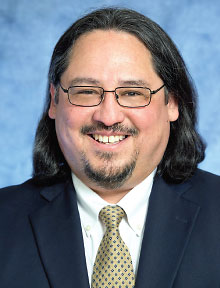After he received his doctorate, Joseph P. Gone, Ph.D., returned to his home reservation of Fort Belknap in Montana to understand how residents there think about mental health. He interviewed a cultural traditionalist named Traveling Thunder, who explained that his community’s troubles are rooted in historical injustices. American Indians lived in harmony and followed strict indigenous customs before colonizers annihilated those customs. According to Traveling Thunder, the White man’s system is “the original pathogen, the origin of these mental health inequities,” Gone said during APA’s online Annual Meeting in June.
Gone is a professor of anthropology and of global health and social medicine and faculty director of the Harvard University Native American Program.
“Today, 20 odd years later, we recognize this explanatory model as what now is called historical trauma,” Gone continued. Traveling Thunder described mental health services as a form of neo-colonial cultural proselytization, he continued. To Traveling Thunder, reaching out to the Indian Health Service for mental health treatment was akin to saying, “Brainwash me so I can forever be like a White man.”
Gone described the challenges associated with providing evidence-based care to American Indians when the norms, routines, and logic of the mental health clinic are not those of the whole tribal community.
“There are epidemic levels of distress in many of our communities,” Gone said, including high levels of trauma, substance use, and suicide. This huge level of need is compounded by an Indian Health Service that is “endemically underfunded,” he added. Yet the solution to the mental health crisis among American Indians is not quite as simple as improving the funding or resources.
The American Indian community is quite diverse, Gone stressed, and many individuals are comfortable with evidence-based practices like psychotherapy. Yet there is also a significant number within the community for whom secular psychotherapeutic services are incomprehensible, he said. “The idea that you would go to a stranger who is getting paid to talk with you about your problems, requiring you to reflect inwardly and cast your feelings into words, just does not make any sense,” he said.
Those individuals are left out of the benefits offered by evidence-based mental health services. However, there are ways to integrate care to incorporate aspects of evidence-based treatment while upholding the traditional healing practices in which many Indigenous individuals believe.
Gone shared an example of his experience working with the urban Indian community in Detroit, which resulted in the development of a program that was intended to bridge evidence-based practices and traditional, spiritual healing practices.
“We designed an Indigenous traditional spirituality program for members of the urban Indian community who were not already familiar with or participating in Indigenous traditional spiritual practices,” he said. He and his colleagues partnered with a traditionalist who runs sweat lodge ceremonies, which became the center of a 12-week curriculum.
“The sweat lodge is interesting because as a ceremony it incorporates several other elements or components that can be practiced independently or as a set, such as prayer, song, or smudging,” he said. A manual for the program explains how to conduct the 12 sessions, including teachings and explanations of different aspects of the sweat lodge ceremony. Further, the program was structured in a way so that it could be evaluated and portable to other communities with large Indian populations.
The Detroit program was particularly successful because it was “by Indians for Indians” Gone said. “Native people are really sensitive to having our traditional ceremonial practices ripped off or misappropriated,” he said.
Very often, cultural competence involves ensuring the therapist is sensitive and does not say anything that might alienate the patient, Gone said. “But cultural competence does nothing to address the actual technologies that we use, the therapies that have their own embedded assumptions within them,” he said. “We need to acknowledge that clinical intervention is, inherently, a form of cultural prescription.”
Some people in Indigenous communities may object to evidence-based practice and claim their traditional healing practices are “practice-based evidence,” Gone said, the evidence being thousands of years of helping their people. “For many, their culture is their treatment.” ■

